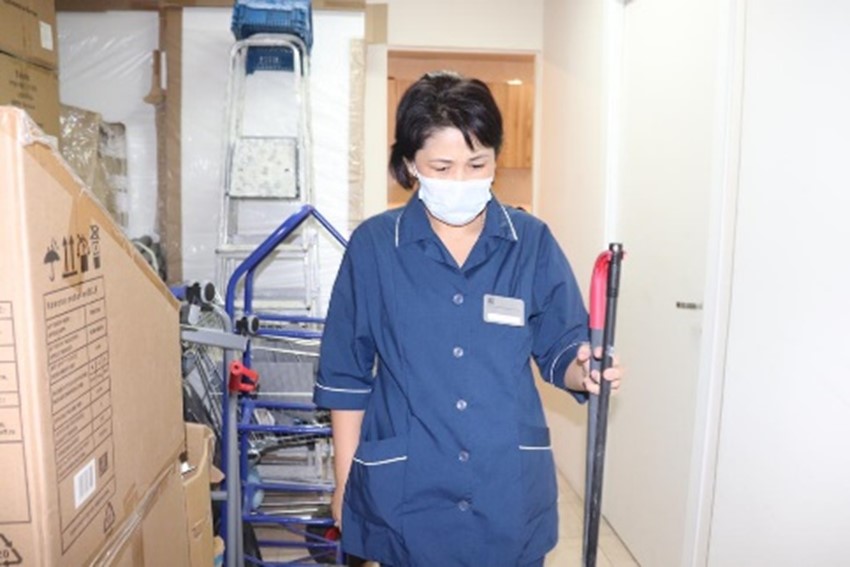
Feb 24, 2022
A study conducted by Insan-Leilek, a Kyrgyz migrant worker foundation, and the Trade Union of Migrants of the Kyrgyz Republic documents abuses suffered by many who migrate to Russia to earn their livelihoods as nannies, adult caregivers, cooks, cleaners and live-in domestic workers. An estimated 750,000 Kyrgyz people have migrated to Russia for work; official Kyrgyz government data estimates that half that number are women.
“We are invisible people,” says 34-year-old survey respondent and domestic worker Almagul. (Her last name is withheld to protect her livelihood and personal safety.)
“The Problems of Informal Domestic Workers,” reflects the experiences of 300 Kyrgyz migrant domestic workers, from whom 24 were selected for in-depth interviews by two migrant worker experts. Respondents’ jobs were in the Russian cities of Kazan, Moscow, Novosibirsk, Samara and Yekaterinburg.
The study reveals a wide range of employment abuses among the mostly female domestic workers who were surveyed, including sexual harassment and violence, other forms of physical and emotional abuse, unpaid hours, excessive workloads, denial of time off and wage theft.
More than 80 percent of the female survey participants who provided in-depth interviews reported sexual harassment at the hands of their employers. Of this group, almost 4 percent had experienced severe sexual violence, including rape, while 25 percent were subjected to indecent touching that included unwanted touching of intimate body parts. More than 30 percent of those reporting sexual harassment and violence said they could not ask anyone for help or support and, of this number, 7 percent attempted suicide. More than 70 percent of those providing in-depth interviews said they were often beaten, allegedly for laziness, and that they can rarely go out.
Two survey participants reported having become surrogate mothers for their employers without a written agreement or fair compensation.
Almost 90 percent of the larger group surveyed (300 respondents) were working without a formal contract because they had secured their jobs through personal connections. Such workers are vulnerable to unregulated work in which hours, pay, duties and conditions are determined at the whim of the employer, some of whom are unscrupulous and exploitive.
“I worked 24 hours a day, and I looked after the children, cooked, did the laundry. Weekends were out of the question,” reports Miraida about a job she held in Russia when she was 18.
Kyrgyz domestic workers in Russia provide an average of 10 hours of work per day, a survey of the larger group of 300 found. Of these, those who live in an employers’ home are working an average of more than 12 hours per day. More than 40 percent said they perform additional services that were not agreed with the employer at the time of hiring, without adjusted compensation.
Respondents were recruited for the survey through Trade Union of Migrants of the Kyrgyz Republic WhatsApp groups and Insan-Leilek diaspora organizations and migrant communities. In-depth interviews were conducted online and over the phone.
Russia is the main destination for approximately 750,000 of Kyrgyzstan’s labor migrants. Official data on the percentage of migrant women employed in domestic work in Russia does not exist.
Insan-Leilek foundation and the Trade Union of Migrants of the Kyrgyz Republic are actively engaged in anti-trafficking programs in Kyrgyzstan, with Solidarity Center support, including last year’s “100 Days Against Trafficking in Persons” youth campaign.
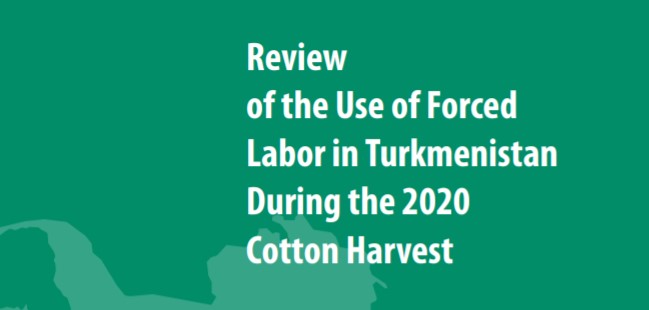
Mar 25, 2021
Cotton bound for global markets from Turkmenistan—the ninth largest producer and seventh largest exporter of the world’s cotton—was again harvested with forced labor last year, finds a new report by the Turkmen Initiative for Human Rights and turkmen.news. Students and public-sector employees—including teachers—were systematically forced into the cotton fields in four of Turkmenistan’s five regions during the 2020 fall harvesting season, documents the report.
“The Turkmen government consistently denies the use of forced labor in the country during the cotton harvest despite abundant evidence to the contrary,” says Ruslan Myatiev, turkmen.news editor and human rights defender.
The report documents the forced participation—under threat of dismissal from their jobs or expulsion from their educational institutions—of public-sector employees and high school, vocational and college students. Report findings are based on evidence documented by trained civil society monitors working for the Turkmen Initiative for Human Rights in four of the five regions of Turkmenistan: Ahal, Dashoguz, Lebap and Mary. Women are especially vulnerable to forced labor in the country because they comprise most of the public-sector workforce traditionally involved in the cotton harvest, says the report.
Public-sector workers, including teachers, were expected to provide so-called voluntary contributions from their salaries or in personal time worked in the fields, or a replacement worker—often their students—for “successful achievement of the state plan for the cotton harvest,” states “Review of the Use of Forced Labor in Turkmenistan during the 2020 Cotton Harvest.” For example, during the country’s eight-day fall break, starting October 22, all teachers in the schools in the Dashoguz region had to pick cotton or pay for a replacement worker to go to the fields.
Forced labor of teachers, doctors and other public-sector employees is crippling health and education public services, says the report, while extortion of money from such employees is exacerbating citizens’ suffering during the country’s worsening economic crisis in the context of COVID-19-related food shortages and rising prices.
“Together with other members of the Cotton Campaign, the Solidarity Center demands respect for international conventions against forced labor. Nobody should be coerced into working the fields, and those who monitor working conditions in the cotton fields must be free to do so,” says Abby McGill, Solidarity Center senior program officer for Eastern Europe and Central Asia.
In Turkmenistan, a Central Asian republic on the northern border of Iran and Afghanistan, cotton cultivation is fully controlled by the state, retaining elements of the planned economy from the Soviet era. It is one of the most closed and repressive states on the planet, currently ranked below North Korea in world freedom scores. The government commits egregious human rights abuses with impunity and there is a total absence of free media. Cotton-sector independent monitors and reporters face ongoing harassment, arbitrary imprisonment, and torture and ill-treatment.
The U.S. State Department ranked Turkmenistan Tier 3, the lowest ranking on its annual Trafficking in Persons report. Cotton from Turkmenistan is on the Labor Department’s list of goods produced with child or forced labor, and the U.S. Customs and Border Protection agency (CBP) prohibits the import of cotton or cotton products from Turkmenistan.
The Cotton Campaign is a global coalition of human rights, labor, responsible investor and business organizations dedicated to eradicating child and forced labor in cotton production in Turkmenistan and Uzbekistan. The Cotton Campaign’s Turkmen Cotton Pledge, committing signatories to preventing cotton from Turkmenistan produced with forced labor from entering their supply chains, has been signed by 119 major apparel and home goods brands and industry associations.
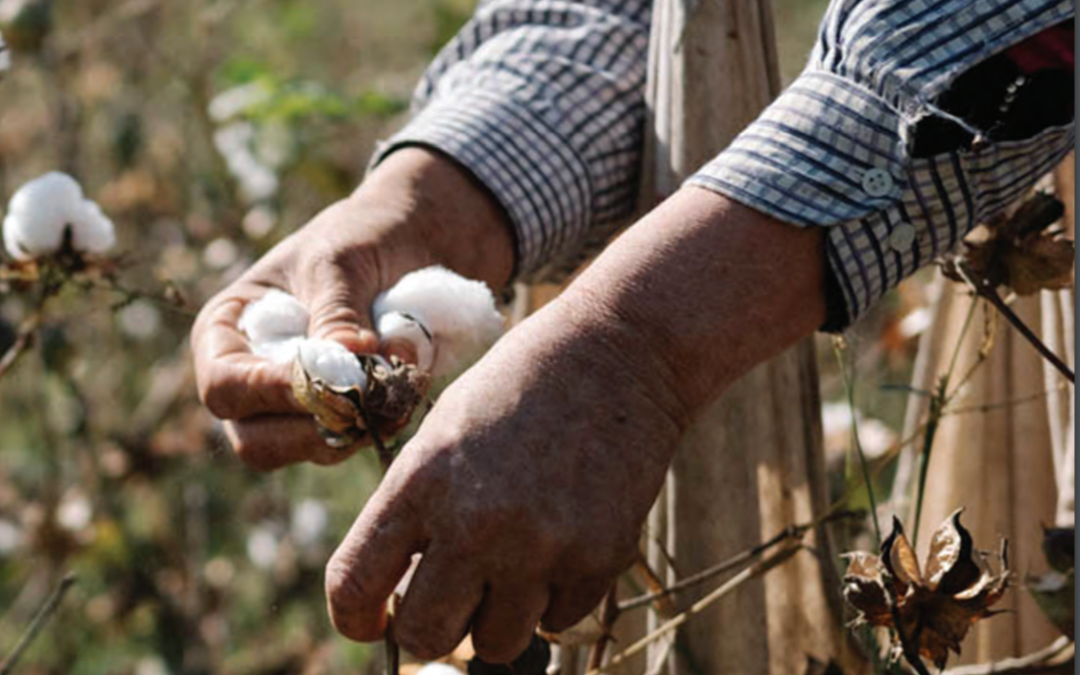
Jun 26, 2020
A new report on Uzbekistan’s 2019 cotton harvest by Uzbek Forum for Human Rights documents progress toward ending—but not eradication—of state-sponsored forced labor, says the Cotton Campaign.
The report, “Tashkent’s Reforms Have Not Yet Reached Us,” finds that a state-imposed cotton quota, labor shortages, lack of fair and independent recruitment channels, and weak accountability systems contribute to the continuation of forced labor in Uzbekistan’s cotton fields—and that broader reform efforts in the country are being limited by slow progress on civil society freedoms.
The report’s findings are based on more than 100 in-depth and hundreds of short interviews with people involved in the cotton harvest, as well as field visits, farm monitoring in six regions, and data and analysis from a nationwide online survey conducted in partnership with the Solidarity Center and public polling/research firm RIWI Corp.
Employees of state and privately owned enterprises in interviews consistently reported being unable to refuse orders to pick cotton by government officials or employers for fear of dismissal or other job-related consequences. About half of online survey respondents said they could not refuse when asked to go to the fields or pay for a replacement picker. This testimony underscores the pressing need to establish effective recruitment systems free from interference or coercion by the government or the authorities, says the Uzbek Forum for Human Rights.
The report also documents that reform of civil society freedoms has lagged far behind the pace of reforms in other key areas, inhibiting the freedom of citizens to form civic associations such as nongovernmental organizations (NGOs) and independent trade unions empowered to fight forced labor in Uzbekistan. The report notes with concern the small number of independent, self-initiated NGOs registered in the country and the high number of rejections for registration.
“Independent NGOs, unions and civic activists have a central role to play in the reform process in promoting transparency and accountability,” says Solidarity Center’s Eastern Europe/Central Asia Director, Rudy Porter. “There is a pressing need to guarantee basic civic freedoms to empower activists to conduct independent monitoring and ensure labor practices are in line with international standards.”
The U.S. State Department’s annual Trafficking in Persons report yesterday specified that Uzbekistan will remain on its Tier 2 watchlist because the country does not yet meet the minimum standards set out in the U.S. Trafficking Victims Protection Act. The report noted that, “During 2019, the government continued to demand farmers and local officials fulfill state-assigned cotton production quotas or face penalties, which caused local officials to compel work in the annual cotton harvest.”
The Cotton Campaign, of which Solidarity Center is a member, is a global coalition of human rights, labor, responsible investor and business organizations dedicated to eradicating child and forced labor in cotton production in Uzbekistan and Turkmenistan. A Cotton Campaign roadmap for the government of Uzbekistan to dismantle the forced labor system of cotton production was presented to government officials during high-level meetings in Tashkent in May 2018.
Photo: Tashkent region, 2019. Credit: Uzbek Forum for Human Rights
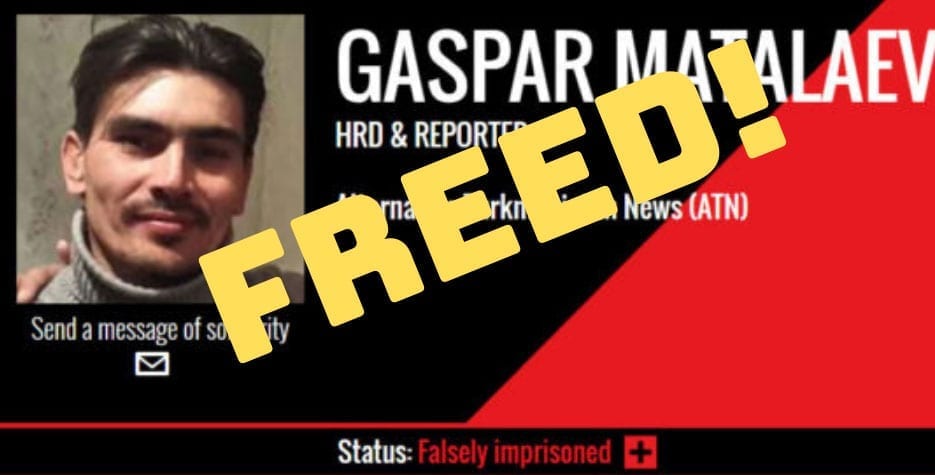
Sep 6, 2019
Gaspar Matalaev, a labor and human rights activist who monitored and reported on the systematic use of forced adult labor and child labor in Turkmenistan’s cotton fields, was released today after serving three years in prison on spurious charges stemming from his reporting.
Matalaev was arrested in October 2016, two days after Turkmen.news published his extensive report on state-sponsored forced labor.
He reportedly was tortured and held incommunicado while in prison, according to the Cotton Campaign, a coalition of organizations, including the Solidarity Center, working to end state-organized forced labor in Central Asian cotton fields.
The global labor and human rights communities are hailing the release, but are united in insisting Matalaev should never have been imprisoned.
“Today is not a victory for justice. Matalaev should never have spent the past three years behind bars,” according to the Cotton Campaign. “We will continue to support activists who expose the injustice of forced labor and modern slavery with the support of our global community.”
The international community rallied in support of Matalaev, with more than 100,000 people signing an online petition to the Turkmen government demanding his immediate release. Activists also picketed the Turkmen Embassy in Washington, D.C. In May 2019, the International Labor Rights Forum awarded Gaspar Matalaev the Defender of Labor Rights Award for making public the Turkmenistan government’s ongoing use of forced labor during the annual cotton harvest.
Some 70 companies, including Levi Strauss & Co and H&M, have signed the Turkmen Cotton Pledge, refusing to supply cotton from Turkmenistan as long as it is produced in a system that relies on forced labor. Additionally, 84 investors of these companies with assets of nearly $860 billion have signed a related investor statement that notes the importance of preventing the presence of Turkmen cotton in companies’ supply chains until the government ends its coercive system.
Turkmenistan: One of the World’s Worst Human Trafficking Records
Turkmenistan has one of the worst human trafficking records in the world, according to the U.S. State Department’s 2019 Trafficking in Persons Report. In 2018, the report found that even as the Turkmen government “continued to engage in large-scale mobilizations of its adult citizens for forced labor in the annual cotton harvest and in public works projects, no officials were held accountable for their role or direct complicity in trafficking crimes.”
Human trafficking within countries of citizenship is especially prevalent in cases of labor trafficking, such as in Turkmenistan.
The Turkmen government “tightly controls all aspects of public life and systematically denies freedoms of association, expression and religion,” according to Human Rights Watch.
In April 2018, the United Nations Working Group on Arbitrary Detention said Matalaev was “subjected to arbitrary deprivation of liberty based on trumped-up charges” and his detention was “a direct result of his exercise of the freedom of expression and opinion.” The working group recommended Turkmen officials release Matalaev and compensate him, but the government ignored all calls for his early release.
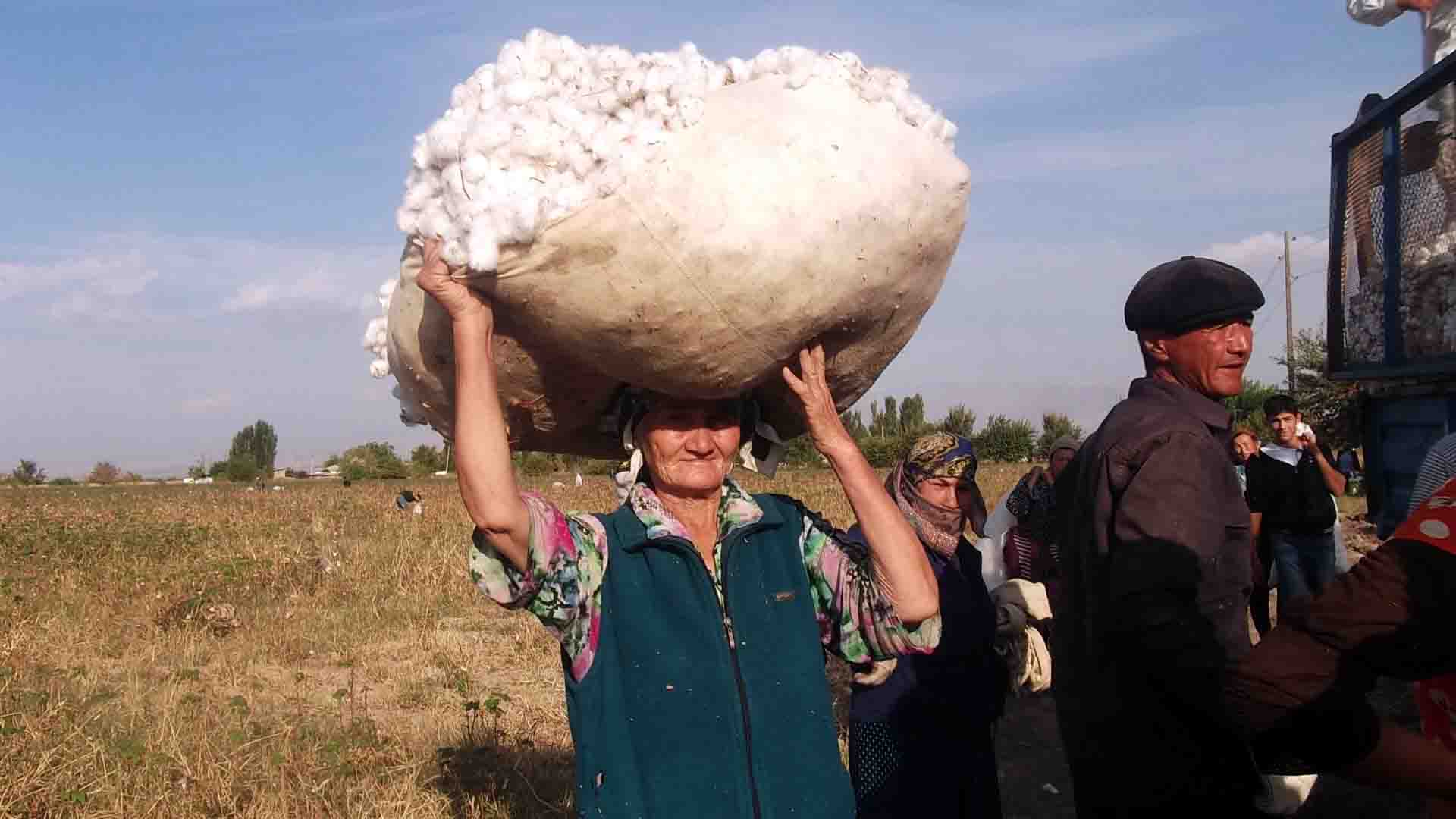
Sep 10, 2018
For the first time in years, large numbers of public-sector employees were not forced to carry out spring fieldwork in Uzbekistan’s cotton fields, although instances of child labor and forced labor were documented, according to a new report by the Uzbek-German Forum (UGF).
Despite progress, “No Need for Forced Labor when Farmers are Empowered to Pay Decent Wages: Spring Cotton Fieldwork 2018” finds that the government-run system of forced cotton production remains in place.
“The shift from the mobilization of workers in education and healthcare institutions to mostly voluntary labor to prepare fields this spring is significant and should be commended,” said Umida Niyazova, UGF executive director. “It is clear that structural problems remain, however.”
“Further scrutiny and careful monitoring will be required during the 2018 harvest to see how far those changes have actually gone in ending forced labor in Uzbek cotton production, and what still remains to be done,” Niyazova continued.
New Policies Enable Farmers to Hire Voluntary Workers for Spring
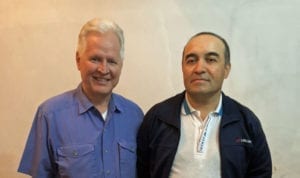
Human rights activist Fakhriddin Tillayev (right) was among political prisoners Uzbekistan released this year. Credit: Solidarity Center
This spring, seven monitors for the Uzbek-German Forum conducted site visits to farms, schools, colleges, clinics, hospitals, banks, markets and local government agencies and interviewed dozens of farmers, education and medical workers, children, union leaders and local government officials.
The monitors found no large-scale organization of forced labor as occurred in past spring weeding seasons. Those who still reported being forced to work included the guards, cleaners, librarians and specialists at schools in the Bayavut district, who said that they weeded cotton fields for 15 to 20 days in May and June.
The report cites two factors behind the reduction in forced labor this spring, including higher procurement prices set by the government. Farmers are required to sell their crop to the government for a set price, and the government this year raised the price from $370 to $706 per metric ton. And for the first time, farmers were allowed to receive cash from banks. With more access to cash and higher payments, farmers are less reliant on unpaid labor for the springtime work required to produce cotton quotas set by the government.
Despite these improvements, farmers also described an overall lack of autonomy and intrusive, punitive oversight by local authorities who impose crop quotas. Penalties for missing those quotas can be severe, including physical violence and loss of one’s land, and state agents apply enormous pressure for them to be met. One farmer said to monitors: “The public prosecutor screams, ‘Quickly plant cotton.’ He threatens, he says, ‘or else I’ll have a criminal case against you.’”
In recent months, the government of Uzbekistan has been willing to talk about reducing forced labor and began releasing political prisoners, including worker rights activists.
“We are seeing unprecedented change in Uzbekistan right now, after a decade of international pressure. We hope respect for workers’ rights, especially ensuring fundamental rights for workers to organize together and negotiate for better working conditions, will follow,” said Solidarity Center’s Eastern Europe/Central Asia Director, Rudy Porter.
The Cotton Campaign, of which Solidarity Center is a member, developed a roadmap for the government of Uzbekistan to dismantle the forced labor system of cotton production, which was presented to government officials during high-level meetings in Tashkent in May 2018.






